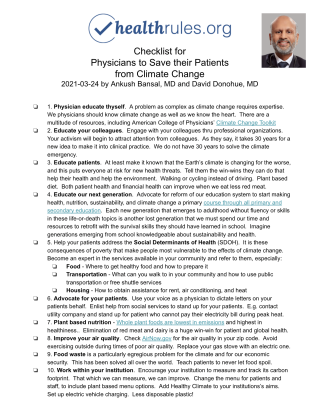The Checklist
If your goal is to save your patients from the Climate Emergency...
On April 6, 2021, Earth passed 420 parts per million of atmospheric carbon dioxide. This was the halfway point to doubling CO2 relative to preindustrial levels.
Although nothing suddenly shifts at this threshold, it shows just how far we have come. CO2 and other forms of carbon in the atmosphere trap heat. They are like a blanket that covers the Earth, keeping us warm. To double that blanket is to trap double heat trapping. There is a delay in seeing the full effects of rising carbon, so we have already locked in worsening warming and climate change for years to come. Meanwhile humans keep burning...
It turns out the planet is sensitive to even small increases in average temperature. A rise of 1.5 degrees C is bad but a rise of 2 degrees C is much worse. 2 degrees C means large scale flooding, crop failure, wildfires, and the death of nearly all coral reefs. At current rates of emissions, we are on a path to see 3-5 degrees C rise by 2100. This level of warming is predicted to cause a massive shift in what part of the world is habitable.
Particularly concerning is the idea of tipping points. The more warming we get, the more polar melting, which causes release of more carbon trapped in Siberian permafrost and also less reflected sunlight (because of less ice and snow). Both of those things lead to more warming, which leads to more melting. And so on, and so on. Those are 2 powerful and worrying vicious cycles that may have already begun.
Climate change causes a host of health problems. Both heat and elevated CO2 levels in the air have been both found to impair our ability to think. Altered weather patterns cause flooding or drought, crop failure, and food insecurity. Wildfires have already increased dramatically, and are predicted to increase multi-fold more as we see more warming. Rising sea level and sinking of the US East coast (due to melting Greenland, which occupies the same tectonic plate) means flooding of coastal cities. Overall, people who are poorer will suffer terribly, but we will all suffer as this century unfolds.
The worldwide burning of fossil fuels also releases toxins and pollutants (like particulates, ozone, sulfur dioxide, nitrogen dioxide, mercury, arsenic, chromium) on a massive scale, damaging our land, water, and air. PM2.5 is a name for very small particulates in the atmosphere. PM2.5 is known to cause significant health problems when we breathe them. We can measure the increase in deaths from lung disease but also heart attacks and early death.
To solve the climate crisis, the planet needs behavior change on a massive scale. Enter the physician. Most of the remedies to the climate crisis increase the health of our patients. Healthy behaviors can be a win-win for the patient, their loved ones, and for the environment. Switching from animal based nutrition to plant based nutrition is a particularly effective change we can make to achieve better health and significantly lower our footprint. Red meat in particular is extremely damaging to our planet, accounting for the lion’s share of carbon emissions and rainforest destruction. We physicians can also help patients adopt behaviors that will protect them in the short term from the immediate health effects of climate change.
While we physicians can accomplish a lot by just advocating with our patients, we need to reach outside of our medical practice as well. Your community may not believe a climate scientist but many are more willing to take scientific information from a doctor.
Checklist for Physicians to Save Your Patients from Climate Change
-
1. Physician educate thyself. A problem as complex as climate change requires expertise. We physicians should know climate change as well as we know the heart. There are a multitude of resources, including American College of Physicians’ Climate Change Toolkit.
-
2. Educate your colleagues as well. Engage with your colleagues thru local medical organizations. Your activism will begin to attract attention from colleagues. As they say, it takes 30 years for a new idea to make it into clinical practice. We do not have 30 years to solve the climate emergency.
-
3. Educate patients. At least make it known that the Earth’s climate is changing for the worse, and this puts everyone at risk for new health threats. Tell them the win-wins they can do that help their health and help the environment. Walking or cycling instead of driving. Plant based diet. Bunch errands. Both patient health and financial health can improve when we eat less red meat
-
4. Educate our next generation. Advocate for reform of our education system to start making health, nutrition, sustainability, and climate change a core course through all primary and secondary education.
Each new generation that emerges to adulthood without fluency or skills in these life-or-death topics is another lost generation that we must spend our time and resources to retrofit with the survival skills they should have learned in school. Imagine generations emerging from school knowledgeable about pollutants, healthy lifestyle, hyperprocessed foods, and the livestock industry. We could see a reversal in the rise of obesity, diabetes, and chronic disease. -
5. Help your patients address the Social Determinants of Health (SDOH). It is these consequences of poverty that make people most vulnerable to the effects of climate change. Become an expert in the services available in your community and refer to them! Most important areas you should have referrals for include:
* Food - Where to get healthy food and how to prepare it
* Transportation - What can you walk to in your community and how to use public transportation or free shuttle services
* Housing - How to obtain assistance for rent, air conditioning, and heat -
6. Advocate for your patients. Use your voice as a physician to dictate letters on your patients behalf. Enlist help from social services to stand up for your patients. E.g. contact utility company and stand up for patient who cannot pay their electricity bill during peak heat.
-
7. Plant based nutrition - Whole plant foods are lowest in emissions and highest in health promoting effects. Elimination of red meat and dairy is a huge win-win for patient and global health.
-
8. Improve your air quality. Check AirNow.gov for the air quality in your zip code. Avoid exercising outside during times of poor air quality. Replace your gas stove with an electric one. Switch to a heat pump. Source your electricity from wind or solar if your utility allows.
-
9. Food waste is a particularly egregious problem for the climate and for our economic security. This has been solved all over the world. Teach patients to never let food spoil.
-
10. Work within your institution. Encourage your institution to measure and track its carbon footprint. That which we can measure, we can improve. Change the menu for patients and staff, to include plant based menu options. Set up electric vehicle charging. Less disposable plastic!
Podcast
Listen to a podcast about this checklist
Contributors

Ankush Bansal, MD FACP FACPM SFHM FABDA MCFLC @drakb1
Ankush is a hospitalist, telemedicine physician, Governor-Elect Designee for the Florida Chapter of the American College of Physicians, President of the Disaster Accountability Project, expert, investigator... The list goes on, folks.

David Donohue, MD MS FACP DipABLM @WellDrDave
Dave is the creator of healthrules.org and helped build this checklist. He is a primary care internist, fellow of the American College of Physicians, and a diplomate of the American Board of Lifestyle Medicine.
Handout

References
Westhoek H, Lesschen JP, Rood T, Wagner S, De Marco A, Murphy-Bokern D, et al. Food choices, health and environment: effects of cutting Europe's meat and dairy intake. Glob Environ Change. 2014;26(1):196-205.
Kristopher B. Karnauskas, Shelly L. Miller, Anna C. Schapiro. Fossil fuel combustion is driving indoor CO2 toward levels harmful to human cognition. GeoHealth, 2020; DOI: 10.1029/2019GH000237
Hancock, P., & Vasmatzidis, I. (2003). Effects of heat stress on cognitive performance: the current state of knowledge. International Journal of Hyperthermia, 19, 355 - 372.
Greenglass, A. Climate Change and Population Health. Delaware Journal of Public Health. October 2017:60-66
Karn Vohra, Alina Vodonos, Joel Schwartz, Eloise A. Marais, Melissa P. Sulprizio, Loretta J. Mickley,
Global mortality from outdoor fine particle pollution generated by fossil fuel combustion: Results from GEOS-Chem, Environmental Research, Volume 195, 2021, 110754, ISSN 0013-9351, https://doi.org/10.1016/j.envres.2021.110754.
Bekkar B, Pacheco S, Basu R, DeNicola N. Association of Air Pollution and Heat Exposure With Preterm Birth, Low Birth Weight, and Stillbirth in the US: A Systematic Review. JAMA Netw Open. 2020;3(6):e208243. doi:10.1001/jamanetworkopen.2020.8243
Caren G. Solomon, M.D., M.P.H., and Regina C. LaRocque, M.D., M.P.H. Climate Change — A Health Emergency. N Engl J Med 2019; 380:209-211. DOI: 10.1056/NEJMp1817067
Crimmins, A., Balbus, J., Gamble, J. L., Beard, C. B., Bell, J. E., Dodgen, D., . . . Ziska, L. (2016). The Impacts of Climate Change on Human Health in the United States: A Scientific Assessment. Washington, DC: US Global Change Research Program. doi:http://dx.doi.org/10.7930/J0R49NQX
Intergovernmental Panel on Climate Change. Global warming of 1.5 °C. October 8, 2018 https://report.ipcc.ch/sr15/
Lin Y, Shih H, Jung C, et alEffect of exposure to fine particulate matter during pregnancy and infancy on paediatric allergic rhinitis. Thorax Published Online First: 11 March 2021. doi: 10.1136/thoraxjnl-2020-215025
In Hawken, P. (2017). Drawdown: The most comprehensive plan ever proposed to reverse global warming.
American Lung Association, State of the Air. https://www.stateoftheair.org
Give Feedback
Is this checklist missing something? Do you have a success story from trying this checklist out? We would like to hear your feedback.


